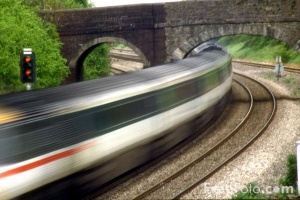Ten-year deal powers Britain’s biggest rail electrification programme in a generation

Network Rail has awarded EDF Energy a ten-year deal for the supply of low carbon electricity to power Britain’s growing electrified rail network.
The contract will see EDF Energy, the largest producer of low-carbon energy in the UK, supply around 3.2TWh of electricity a year, powering a network which carries 3m passengers and tens of thousands of tonnes of freight a day. EDF Energy will ensure 100% of the electricity it supplies to Network Rail will be matched by low carbon energy generated from its eight nuclear power stations.
The majority of electricity supplied will be used to power electric trains, which now account for 55% of rail traffic. This is set to grow considerably over the coming years as Network Rail carries out work to electrify more than 2,000 track miles across Britain.
Once electrification schemes are complete including the Great Western Main Line, Liverpool to Manchester and Preston, the ‘electric spine’ from Southampton docks to the West Midlands and Yorkshire, three-quarters of all rail traffic in Britain will be electric powered.
David Higgins, Network Rail chief executive, said: “Rail is already the greenest form of public transport and this partnership with EDF Energy will help us make it greener still. Our work to electrify hundreds of miles of railway represents the biggest programme of rail electrification in a generation and will provide faster, quieter and more reliable journeys for millions of passengers every week while cutting the cost of the railway.
ADVERTISEMENT
“Thanks to a firm commitment from government to invest in electrification schemes across the country, we are transforming the railway and providing Britain with a sustainable, world-class transport system that is fit for the future. This innovative contract for low-carbon energy will provide excellent value to the rail industry and means we are not only providing a greener railway, but also a better value railway for Britain.”
Vincent de Rivaz, CEO of EDF Energy, said: “Network Rail is the biggest single electricity customer in the UK so this long term deal is a massive vote of confidence in our nuclear-backed energy. Rail is already one of the least carbon intensive ways to travel and the huge investment in electrification will be backed by a stable and affordable supply of low carbon energy.
“The deal places nuclear energy at the heart of the UK’s infrastructure for the next 10 years and serves to underline that nuclear power is part of everyday life in Britain. It’s a big boost for EDF Energy following our success in winning the supply contract for the UK Government – which includes the NHS, Highways Agency and the Metropolitan Police – along with a deal agreed last year to supply the majority of Scotland’s public bodies.”
Under the ground-breaking arrangement, EDF Energy is offering Network Rail the unique capability to purchase their electricity requirements up to 10 years in advance, helping to deliver greater certainty over costs and significantly reduce exposure to short term, volatile energy prices.
With a network containing more than 20,000 miles of railway, tens of thousands of signals and hundreds of signal boxes controlling 25,000 trains a day, Network Rail is the single biggest consumer of electricity in Britain.
Network Rail procures electricity centrally for the rail industry. Traction electricity charges recover the costs of electricity supplied by Network Rail to train operators for their use of traction electricity through overhead lines and third rail power systems.
Currently only 40% of the rail network is electrified, including most of the south east of England, and the main lines from London to Edinburgh and Glasgow, as well as the Merseyrail network around Liverpool and the Glasgow suburban network. By 2020, 54% of the network will be electrified with electric trains accounting for 75% of all rail traffic.

